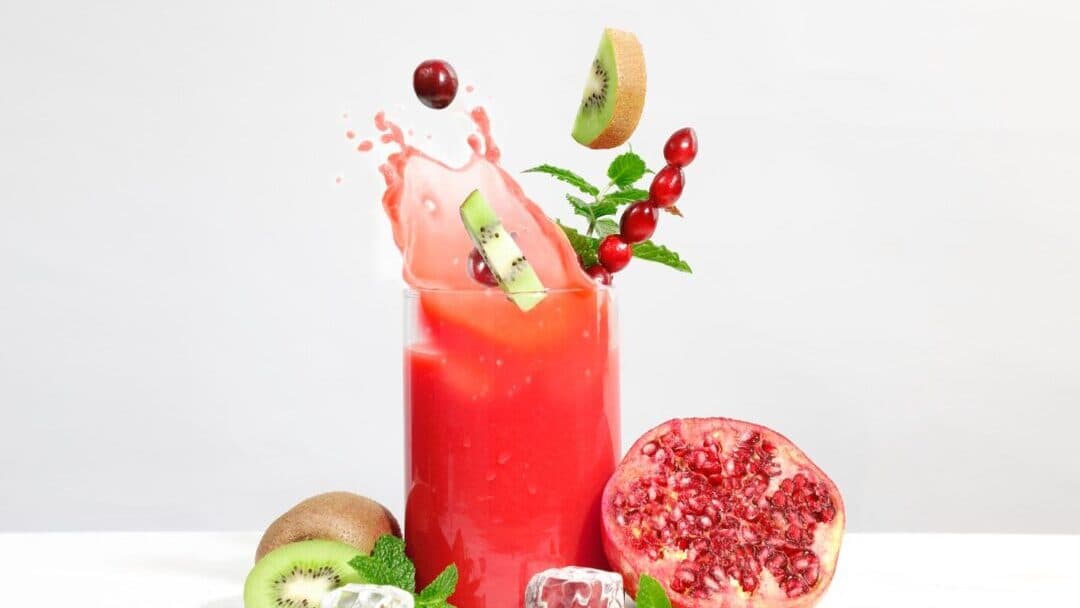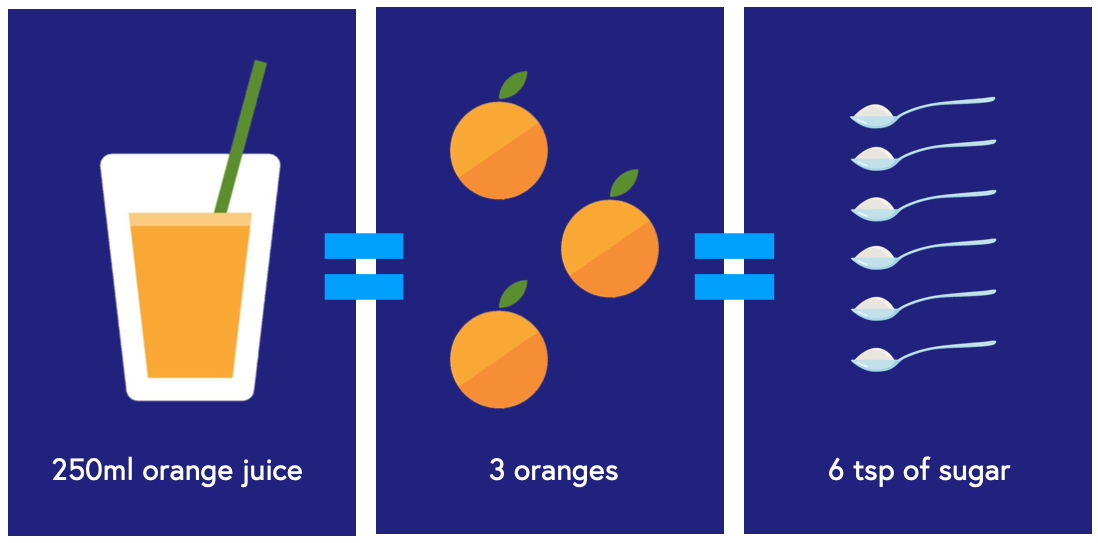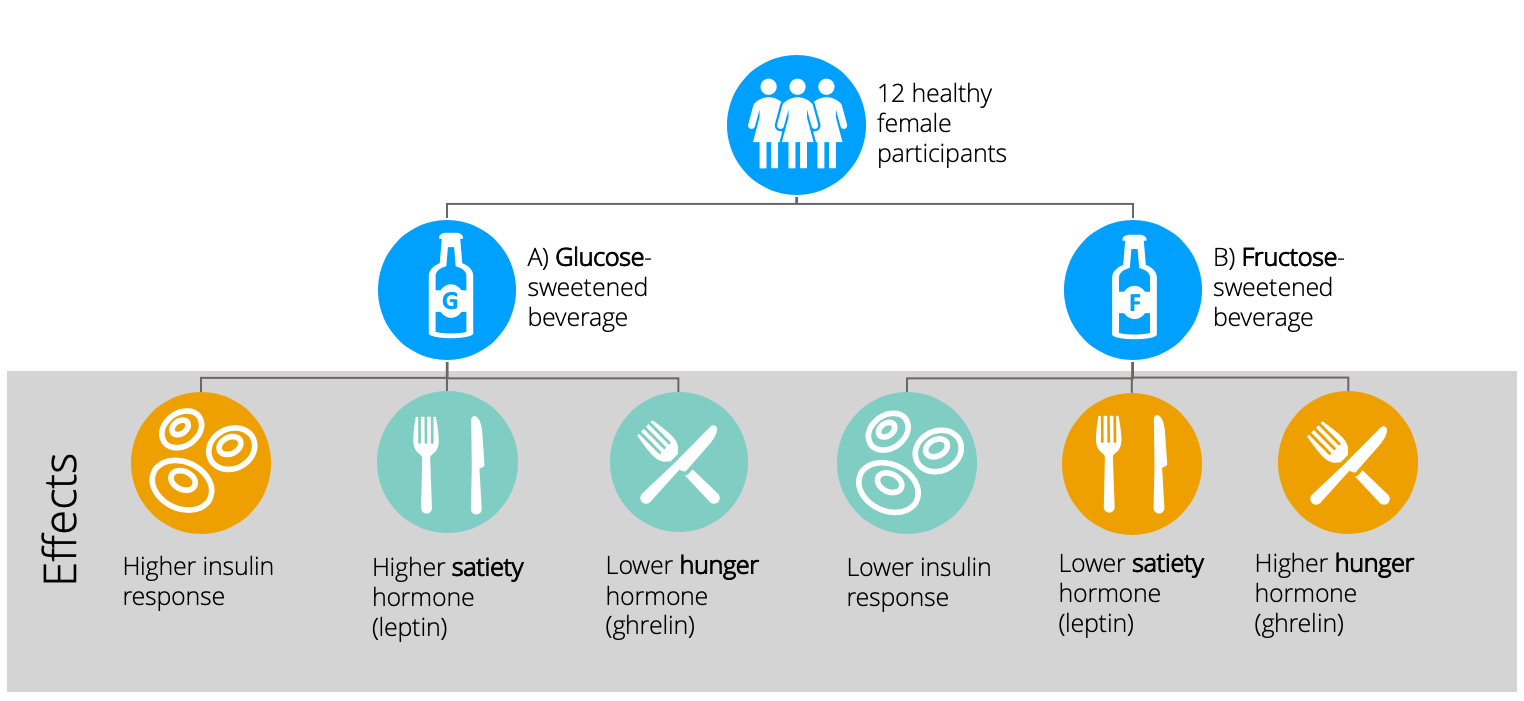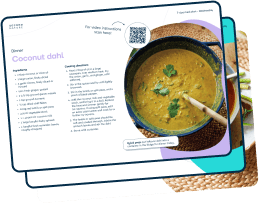Myth Busting
Is fruit juice healthy?
Written by
Tamara Willner
Medically reviewed by
Dr Rachel Hall (MBCHB)
Principal Doctor
6 min read
Last updated February 2026

Medication-assisted weight loss with a future focus
Start with Wegovy or Mounjaro, transition to habit-based health with our support


Myth: ‘Drinking fruit juice is a healthy way to get your five a day’.
We’re all aware of the common slogan ‘You should have five portions of fruit and vegetables a day’.
Many of us think that a glass of freshly squeezed juice, such as orange or apple juice, will count as one of our 5-a-day and that we’re making a healthy choice.
This is most likely because national guidelines count fruit juice as 1 of our five-a-day. However, there’s a reason that guidelines suggest that we limit juices to providing only 1 of our 5 portions of fruit and vegetables.
Calling fruit juice and fruit smoothies ‘healthy’ is highly misleading. This guide will bust the myth that fruit juice is a good option to help us reach our 5-a-day.
Sugar
Similarly to fruit, fruit juice contains a number of vitamins and minerals, which is one reason why some claim that it’s ‘healthy’. However, it also contains a huge amount of sugar.
We can gain the health benefits of these vitamins and minerals from whole foods without the downfall of taking in large amounts of excess sugar. For example, vitamin C, present in orange juice, is also found in peppers, kale, and spinach, which are all much lower in sugar.
Let’s explore the example of orange juice. An average 250ml of shop-bought orange juice contains 26g of sugar (over 6 teaspoons). Freshly squeezed orange juice contains a similar amount. This is the equivalent to eating roughly 3 oranges.

Sugar takes a number of different forms. Glucose, fructose, and sucrose are all types of sugar. Fruit juice contains glucose and fructose.
Glucose
When we eat and drink foods that contain carbohydrates, they’re broken down into glucose. Our pancreas then releases insulin to move the glucose into our cells, to be used for energy. The more our blood glucose levels are raised after eating and drinking, the more insulin is released by our body to lower our blood glucose back down to normal levels.
Humans are good at adapting, and when the body is regularly exposed to large amounts of insulin, it adapts. The body becomes less sensitive to insulin, a state known as ‘insulin resistant‘. Over time, insulin resistance can lead to type 2 diabetes.
Fructose
Fructose on the other hand, which is the other sugar in fruits and fruit juices, doesn’t trigger the same insulin response as glucose and travels to the liver to be broken down. If we overload our liver with fructose, for example by drinking lots of fruit juice or sugary drinks, then the liver converts some of the excess fructose to fat, which gets released into the bloodstream.
This leads to the build-up of fat in our bodies, in particular, fat around our organs which is strongly linked to health complications. In the long run, fat around our liver also contributes to insulin resistance.
On top of this, research suggests that fructose plays a role in our gut hormones, which signal to our brain when we feel full or hungry. One randomised controlled study split women into 2 groups, where both groups ate identical meals but group 1 was given a glucose-sweetened drink and group 2 a fructose-sweetened drink.

Those in the fructose group showed lower levels of leptin (the hormone that makes you feel full) and higher levels of ghrelin (the hormone that makes you feel hungry). Researchers believe that this may be because fructose doesn’t trigger the same increase in insulin that glucose does. Insulin plays a role in regulating our gut hormones. If we feel hungrier then we are more likely to snack or eat more than we would otherwise.
Key points:
- Although fruit juice does contain vitamins and minerals, it also contains a huge amount of sugar, specifically fructose and glucose.
- Fructose leads to a build-up of fat in our bodies and influences our gut hormones, leaving us feeling more hungry.
Natural vs added sugars
Some argue that fruit juice contains ‘natural’ sugars, and so it’s better for our health than soft drinks or drinks with added sugars. But this isn’t correct. Fruit juice, both freshly squeezed and shop-bought, is now classified in the UK as an added (free) sugar, as the sugar in fruit juice has been released from its cellular structure during manufacturing.
Free sugars are those added to foods during manufacturing in products like biscuits and ice-cream, with the addition of fruit juice and honey. On the other hand, natural (intrinsic) sugar exists in certain foods like whole fruits and milk.
In the UK, the maximum recommended daily amount (RDA) of total sugar for adults is 90g per day, and the maximum RDA of free sugar is 30g per day. To put this in context, we can look back to our orange juice example, where 1 small glass of juice (26g of sugar) almost takes us to the recommended daily limit. 1 small glass of Coca-cola provides the same amount of sugar (26g).
Although fruit juices may have more vitamins and minerals than fizzy drinks and sweetened drinks, the sugar gets processed the same way in our body and has the same harmful effects on our health, from tooth decay to increasing our risk of heart disease.
Key points:
- Fruit juice is classed as an added (free) sugar.
- Natural (intrinsic) and added (free) sugars are processed the same way in our body.
- 1 small glass of orange juice has the same amount of sugar as 1 small glass of Coca-cola.
What about fruit?
Whole fruits, rather than fruit juice, still contain sugar. However, they also contain fibre and water that help to control the rise in blood glucose and fructose levels as the sugar from the fruit is broken down more slowly over time.
It’s also unlikely that we would consume the same amount of sugar from whole fruits than we would from juice, as we would have to eat 3+ pieces of fruit in one sitting. Eating fruit with other sources of protein or healthy fats, such as nut butter or full-fat, unsweetened yoghurt, will further help to slow down the digestion of sugars.
It’s worth noting that certain fruits contain more sugar than others. For example, blueberries and raspberries contain less sugar than mangoes and bananas.
While dried fruit does contain the fibre component of whole fruit, it’s still a more concentrated source of sugar compared to fresh fruit. This makes sense when we consider how easy it is to consume a packet of dried mango slices compared to eating 1-2 whole, fresh mangoes.
Key points:
- Whole fruits contain fibre and water, which slow the breakdown of the sugar from the fruit.
- Dried fruit contains the same fibre still, but without the water, meaning the sugar in dried fruit is far more concentrated. Plus it’s easy to overeat.
Other beverage choices
The best way to avoid drinking sugary fruit juices is to avoid buying them in supermarkets and reduce temptation in our home. Instead of fruit juice, squash, or fizzy drinks, choose the following options:
- Water: it’s obvious, and maybe a bit boring, but water really is the best choice. It’s readily available and inexpensive. To add flavour, try slicing up some lemon, lime, or orange wedges to soak in the water, or choose sparkling water.
- Plain fruit tea, black tea, herbal tea, and coffee: if you fancy a warm drink, these are all good options provided there’s no added sugar. If you opt for coffee or caffeinated teas, aim to have these before lunchtime to sleep better.
- Milk: a good source of protein and calcium, which is needed to maintain bone health.
Key points:
- Water should always be the first choice beverage. Sparkling water or adding lemon/lime/orange wedges can make it more exciting.
- Teas, coffee (both without sugar), and milk are also a good option.
Take home message
- Fruit juice is often promoted as ‘healthy’, but this isn’t necessarily the case.
- Although fruit juice does contain vitamins and minerals, it also contains a huge amount of sugar, specifically fructose and glucose.
- One glass of orange juice contains roughly 26g of sugar, the equivalent of around 6 teaspoons of sugar or a glass of Coca-cola.
- Fructose leads to a build-up of fat in our bodies and influences our gut hormones, leaving us feeling more hungry, whereas glucose causes a spike in our blood sugar levels.
- Fruit juice is classed as an added (free) sugar.
- Natural (intrinsic) and added (free) sugars are processed the same way in our body.
- Juicing fruits strips the fibre and water from the whole fruit, which means that the sugar is broken down much faster.
- Aim to choose water, tea, coffee (without sugar), or milk as alternatives to fruit juice.
Medication-assisted weight loss with a future focus
Start with Wegovy or Mounjaro, transition to habit-based health with our support



Download our free, indulgent 7-day meal plan
It includes expert advice from our team of registered dietitians to make losing weight feel easier. Subscribe to our newsletter to get access today.
You might also like
Balhouane
13 February, 2023
Howe many km walk to detox sugar form 2 glass orange whole fruits naturaly
Anna
15 February, 2023
Hi there,
Thanks for your comment!
We’re unsure what you mean by your question.
Would you like to know more about detoxing?
Thanks!
The Second Nature Team
Karen Hurst
9 September, 2021
Is shop bought sugar free flavoured water any good
Anna
20 September, 2021
Hi Karen,
Thanks for your comment!
Please see this guide for our take on sugar-free options.
We’d recommend adding lime, lemon, or cucumber to your water, or infusing with different types of fruit. You can also try one of our mocktails:
Tropical sunrise mocktail
Rasberry, lime, and mint mocktail
Our programme will provide you with detailed nutritional guidelines. If you’re interested in learning more, you can take our health quiz here, or email support@secondnature.io with any questions 🙂
Julie
4 April, 2020
From a dental view, fruit juice is also very acidic and damages the teeth. The fibre in fruit helps buffer the acids. It is much better to eat rather than drink fruit.
Marilyn
29 March, 2020
That was informative. I always believed freshly squeezed orange juice was healthy, although I don’t drink it often. I will try to drink more sparkling water.
As seen on
As seen on
